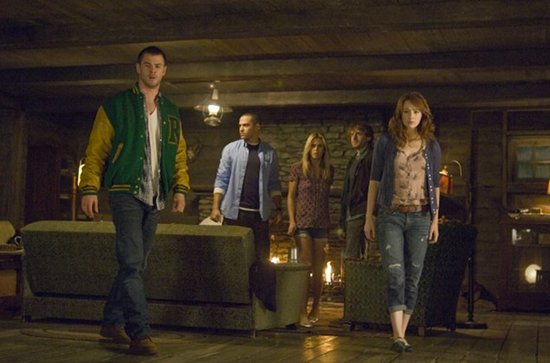

By Kim Voynar Voynar@moviecitynews.com
Review: The Cabin in the Woods (Spoiler-Free)
All you need to know at this point is this: You should absolutely go see The Cabin in the Woods. Yes, it’s been hyped so much that you’re probably thinking, “Oh, there’s no way it’s THAT good.” Whether you end up thinking it is that good or not, to miss this film is to render yourself mute at watercooler conversations and happy hours for at least the next couple weeks. You’ll just have to stand there nodding your head and trying to pretend you know what you’re talking about every time someone says, “Oh my God, Cabin in the Woods, right?!” and you’ll say something stupid about the movie you didn’t go see, and everyone will stop talking and give you that look. You don’t want to be that guy.
This is the kind of film you could watch over and over again and still find something you missed on the previous viewings, but the first time, you really should see it knowing as little as possible. The bare bones, so to speak: We have our requisite five good-looking kids who vaguely remind you of the Scooby Gang (coin toss on which of them is Scooby): Our players are The Sporto (Chris Hemsworth), The Beauty/Slut (Anna Hutchison), The Stoner (Fran Kranz, who brilliantly manages to simultaneously evoke Shaggy and be way cooler than Shaggy), The Nice Girl/Kinda-Sorta-Almost Virgin (Kristen Connolly) and The Handsome, Nice and Brainy Guy (Jesse Williams). We have our beat-up RV standing in for the Mystery Machine, the Creepy Old Guy Who Warns Those Darn Kids to Stay Away from the Mysterious Cabin. And of course, we have the titular Cabin itself, which you have no doubt seen on the movie posters flying in the air and turning itself into some kind of puzzle box. That, my friends, is absolutely all you should know, except for this:
Just when you think you know where this movie is going, along come Bradley Whitford, Richard Jenkins and Amy Acker as a trio of government bureaucrat types in some vast, blandly institutional place that looks like it could be any government office building anywhere. And you’ll think, “What the hell is that about?” But you’ll figure it out soon enough, and it’s all pretty clever and cool and really, a great concept for a movie. In spite of my admiration for the idea of the film, my one quibble with The Cabin in the Woods is that while it is a great concept, the characters do tend to feel like constructs designed to fit within that cleverness, as opposed to starting with compelling characters and letting the story build around them, but when you have an idea as good as this one, what’re you gonna do? First-time director Drew Goddard (who’s been earning his stripes writing and story supervising for Joss Whedon and JJ Abrams for years) does a mostly fine job of trying to flesh them all out at least a little bit, and for the most part he’s smart enough to let us learn more about them by the actions they take rather than by boring us with exposition, so I can live with that.
The Cabin in the Woods isn’t derivative, exactly, but it manages to pull of the hat trick of paying homage to more classic horror films than I could keep track of (no doubt my more horror-fanatical friends could tick most of them off for you). The plot structure aims to be somewhat subversive of the horror genre like Scream, but it’s smarter than that film in a way that reminded me more of the vastly under-appreciated Tucker and Dale Vs. Evil. It’s smart without being smart-assed, clever without being condescending. Its central conceit is fairly brilliant, but it’s not in-your-face about wanting to make sure you know how smart it is, and it’s certainly neither twee nor precious. There’s also some great production value, with a third act that’s a horror geek’s wet dream. Sure, there are plot holes here and there, but does any horror film not have a few plot holes?
Once you’ve seen The Cabin in the Woods, we can talk and dissect it all you like, but right now I’m on vacation with my kids and you haven’t seen it yet, so go see it and we’ll talk later, when there won’t be any spoilers for me to spoil for you. So go see it already, with a pack of friends or that special someone. Unless you are exceedingly squeamish or completely loathe horror as a genre, you will have a great time. Worst case, you hate it, and then you get to be the sad, bitter, snarky contrarian of your social circle. Hey, someone has to be that guy, and Armond White can’t be everywhere.















